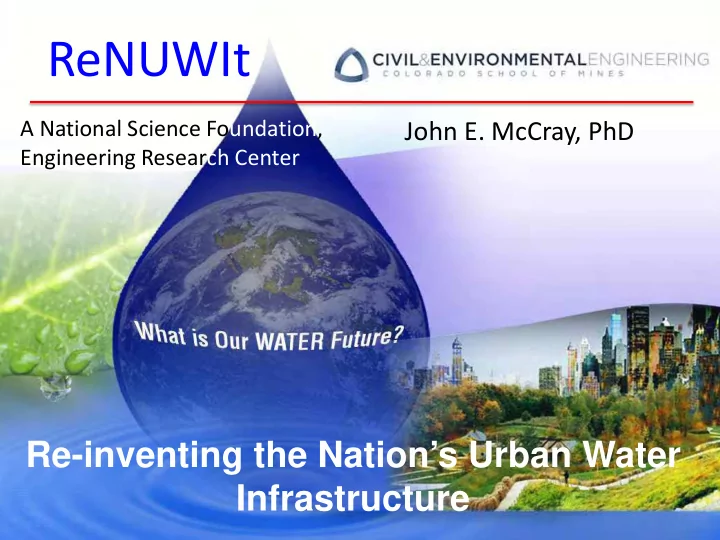

ReNUWIt A National Science Foundation, John E. McCray, PhD Engineering Research Center Re-inventing the Nation’s Urban Water Infrastructure
ReNUWIt • Collaboration among four universities engaged in long-term research • Research that spans from the fundamental to the test-bed to the systems-level • Outcomes that translate to practice • Informed by understanding of institutional frameworks 2
The S anitation Paradigm of the Ancients Engineered wat er supply during t he Roman Empire (~600 B.C.) Import t he wat er Use it once Flush away wast e Discharge t o st reams Cloaca Maxima River Tiber
anitation Paradigm of the 19 t h Century The S Wat er supply during “ modern” t imes California S tate Water Proj ect (444 miles) • Largest single user of energy in CA; 2-3% of entire state energy demand Import t he wat er Use it once Flush away wast e Discharge t o st reams Natural Resources Defense Council (2004). Energy Down the Drain. The Hidden Costs of California’s Water Supply.
• Increases in population will stress our resources Populations are Shifting to Urban Areas • Increasing contributions of municipal effluents and run-off in surface water
Threats to Water S upply – Populations moving to Water S carce Regions Population trends 1970 – 2030 Increase 50 – 250 % Population trends 1970 – 2030 Decrease 20-40% Increase 50 – 250% US Census, 2002
Estimated Water Runoff Changes 2041-2060 relative to 1901-1970 % on map: agreement among 24 GCMs as to decrease or increase P.C.D. Milly, USGS, 2005
Reuse seems inevitable, but we must overcome barriers S ocial, policy, and legal (S PL) barriers for direct potable reuse (DPR), but even for indirect and non-potable re-use. $$$ for Wastewater treatment plants to retrofit $$$ for dual-distribution systems One effluent quality limits options for reuse Amenable customers not always co-located with plants.
ReNUWIt ERC Urban Systems: Social, policy, legal barriers CO Front Range Los Angeles CO Front Range SF Bay Area SF Bay Area Managed Natural Systems Engineered Systems Stormwater as drinking Smart Urban Water Grids Tailored Water Test Bed water resource, clean Energy-Positive WWT, DPR water leaving cities CO Front Range Water Reuse & Ecosystem Benefits 9
What are the opportunities? U.S. Population projected to increase ~ 50 % by 2050. • Aging infrastructure can’t handle it San Fran • Blue infrastructure /sustainability/ recreation is marketable • Incentivises decentralized sustainable water-energy systems 10 Denver
Engineered Systems Long-term vision: Integrated resource & energy recovery Solids Anaerobic Nitrogen & Advanced Fresh Wastewater treatment phosphorus removal oxidation water recovery Tailored to a specific Energy Materials Fertilizer use Anaerobic Solid Nitrogen & Soil digestion or phosphorus Organic Organic gasification recovery Matter Wastes 11
Natural Systems Storm-water: Collect, store, clean, use Cleaner water flowing through and leaving our cities Smart Urban Water Grids Social, economic and health benefits Subsurface Treatment Actively Managed & Storage Surface Waters Urban Drool
Urban Systems: Identify and Overcome SPR Barriers New WWTP in Pacifica, CA Old WWTP in Pacifica, CA • Newer Technology • Activated sludge • Discharge to ocean, create blue- • Ocean outfall green infrastructure. Middle of human habitat, Wildlife, aesthetic, recreational, no benefits to ecosystem water quality improvement 13
Recommend
More recommend